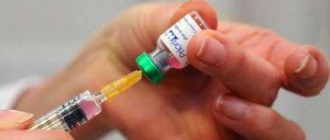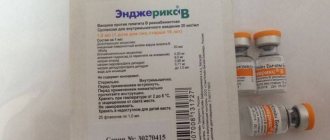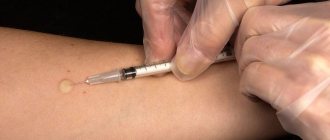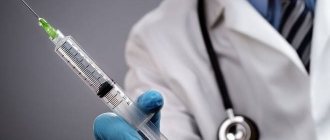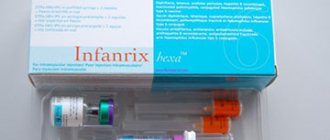Vaccination with ADS-m is a private version of DTP. But it does not contain an anti-whooping cough component. Today, ADS-m is used for revaccinations in order to activate and prolong immunity acquired previously.
At what age is the ADS-m vaccine given? It is used for adults and children over 4 years of age. This is explained by the fact that for these age categories, whooping cough is not as dangerous as for infants. From 4-5 years of age, it occurs in a mild form, and the likelihood of death is low.
Tetanus and diphtheria are dangerous infections that can affect absolutely all people if they are not vaccinated. Tetanus can be infected by getting the pathogen into any open wound, for example, while relaxing in nature or while doing garden work. The vaccine forms immunity to these diseases, but over time it weakens. It is important not to skip revaccinations and, especially, not to refuse them.
Who is the vaccine suitable for?
ADS-m has a wide range of applications. It is indicated for people who are subject to vaccination against diphtheria and tetanus every ten years. It is also used in cases where children are found to be intolerant to ADS and DTP. ADS-m contains half the dose of diphtheria and tetanus toxoids, but it is enough to support and activate the already acquired immunity.
Today, domestic and imported vaccines are available. The latter is less likely to cause unwanted reactions in the body. ADS-m can be divalent combined or monovalent - used separately against tetanus and diphtheria.
Peculiarities
The main purpose of this vaccine is to develop immunity against diphtheria and tetanus infections. Like any other vaccine, it has its own characteristics and contraindications. It is used only for revaccination, that is, to activate and maintain existing immunity.
Since the ADSM vaccination does not include a drug against whooping cough, and this disease is very dangerous for children under 4 years of age, it begins to be used after the child reaches this age. This vaccine is used both for adults (vaccination every 10 years) and for children who have contraindications for DPT and DPT. There is both a domestic version and a foreign analogue on the market. It is worth noting that in addition to the two-component vaccine, it is possible to use the diphtheria and tetanus vaccines separately.
There is a common misconception that bivalent (two-component) vaccines are inferior to monovalent (one component) vaccines. This argument is often made by parents when opposing vaccinations. And they are mistaken. In fact, the use of multivalent vaccines in children and adults is a well-established practice.
After all, such vaccines have a number of undoubted advantages:
- High degree of purification. To ensure that components do not conflict with each other, pharmacists achieve a high level of purity of each component. This means that the use of polyvalent vaccines has fewer consequences.
- Reducing the number of injections. Agree that many adults are afraid of injections. What can we say about children? Reducing pain is a definite plus, especially for young patients.
- Reducing the amount of preservatives and other substances introduced. It's no secret that many vaccines contain additional substances. Some of them are the reason why unpleasant consequences of vaccinations occur. With the use of polyvalent vaccines, fewer of these substances enter the human body.
Creating multicomponent vaccines is a very expensive undertaking. After all, the latest achievements in genetic engineering and the latest equipment are used for this. Unfortunately, in our country it is quite difficult to organize the production of such vaccines, so we have to purchase expensive foreign drugs or use domestic monovalent analogues.
Thus, if you are faced with a choice of which vaccination to get - ADSM or separately AD and AS, then a safer option, especially for children, would be a multicomponent vaccine.
What are the advantages over BP and AS drugs?
ADS-m is called bivalent, since it contains components against two infections. Many parents mistakenly believe that monovalent vaccines are better and easier to tolerate by the child’s body. In fact, to obtain polyvalent drugs, all components must be biologically pure, so the body’s response to them is much milder.
One more advantage cannot be discounted - you do not have to take several injections. Moreover, all ballast substances included in the vaccine enter the body only once. If you use monovalent drugs, their number increases significantly.
ADS children
Knowing the decoding and timing of the DPT-m vaccination, it becomes clear that, as a rule, children under 6 years of age are usually vaccinated with DTP. But sometimes their body rejects this vaccine, which results in allergic reactions and other side effects that can be very severe. In this case, the doctor decides to use ADS-m. This is due to the fact that it is often the pertussis component that causes reactions.
In order for immunity to develop, doses of toxoids must be quite large, otherwise infectious diseases will be severe. If a gentle vaccine causes swelling, redness, and inflammation at the injection site, then data about this should be included in the child’s medical record. Children are vaccinated at 3, 4.5 and 6 months, and a drug against Haemophilus influenzae is administered at 3 months. To consolidate the effect, a booster dose is added at 1.5 years.
For revaccination, a smaller dose is used, since primary immunity has already formed. In the future, vaccinations in children cause a negative response from the body much less often, as the vaccine is well tolerated.
Indications and contraindications for vaccination
Some time after administration of the DPT vaccine (or DTP, which includes whole or fragmented pertussis bacteria), the effectiveness of producing antibodies against tetanus and diphtheria decreases. In order to constantly maintain the strength of the immune system, which can successfully fight against infections, all children over 4 years of age and adults who have received DPT are advised to give repeated injections after a certain period of time. Revaccination with ADS is carried out in small doses every 10 years after the injection given at the age of 14. This helps maintain the production of antibodies against tetanus and diphtheria at the desired level. After revaccination, a person will be able to tolerate tetanus and diphtheria without serious complications for his health. Such drugs are indicated for everyone who has been vaccinated with DTP.
The number of contraindications to such immunization is minimal. The main ones are pregnancy and the course of an acute (inflammatory or infectious) process in the body. After recovery or the end of pregnancy and the period of breastfeeding, you will need to undergo revaccination, because tetanus and diphtheria are dangerous diseases that threaten a person’s health throughout his life.
In addition to those mentioned, contraindications include:
- allergy to one or more components of the drug;
- state of immunodeficiency.
In most cases, if there are contraindications, revaccination is postponed to a later date or an analogue of the drug that is safe for the patient is selected.
In general, the procedure is easily tolerated. It can be prescribed at the initial stage of immunization if a child exhibits a pronounced allergic reaction to usual doses of toxoids.
Vaccination and pregnancy
The Russian Ministry of Health prohibits injections of the described vaccine drug into pregnant women. If the period of revaccination coincides with the dates of the planned fertilization, then family planning should be postponed for a certain period. First, you need to support your immunity with a routine vaccination, after which you need to abstain from conceiving for another month or two.
If the re-vaccination falls during pregnancy, the date of the next revaccination is postponed. You must first give birth and complete breastfeeding, and then get the vaccine.
If vaccination was carried out in the prescribed manner, and a month later (or earlier) the woman found out that she was expecting a child, there would be no need to terminate the pregnancy. You need to report this fact to your obstetrician-gynecologist, who will closely monitor the development of the fetus. Termination of pregnancy will be done only if severe pathologies are detected.
The vaccine is safe in reduced doses, which is why in the West it is also given while expecting a child. Due to the mutation of tetanus and diphtheria bacteria in the United States, women in the last weeks of pregnancy are recommended to get vaccinated. This is explained by the greater risk to the health of mother and child from the diseases themselves than from vaccine preparations.
Vaccination and pregnancy
The vaccine is not given during pregnancy. After the planned dose, the woman should use protection for a month. Only after these deadlines have passed can you plan for the baby. The vaccine may have adverse effects on the fetus.
If the date of the scheduled vaccination falls during pregnancy, then you need to wait until the birth, and only then do revaccination. Before doing this, you must obtain a doctor's permission for this procedure.
If a woman gets vaccinated and after some time finds out about her pregnancy, then there is no point in interrupting it. But you need to be carefully observed by a doctor and make sure that the fetus does not have any malformations. If serious problems are identified, then only then should you discuss with a specialist the advisability of interruption.
Preparing for vaccination
First, you need to make sure that your baby can be given the drug. Carefully study the contraindications:
- Drug intolerance. If a child had a strong nonspecific reaction to a vaccine in infancy, it is dangerous to give it again
- Chronic diseases in the acute stage.
- Colds and viral infections, even if you have already been ill, can be vaccinated no earlier than two weeks later.
- A surgical intervention that was carried out the day before or is planned in the near future.
- Any severe inflammation
- Depleted immunity
- Diseases associated with hematopoiesis
- Severe underweight
Before any vaccination, ADSM is no exception, experts recommend starting to take antihistamines. This will help avoid severe allergic reactions.
It is better to postpone hardening procedures, trips to nature or places where there are large concentrations of children until a more suitable time.
Avoid experiments in nutrition. New exotic fruits, fatty, overcooked foods will make it difficult for the stomach to work, and during vaccination, the load on it is quite large.
Unfortunately, in our country, the decision about whether to vaccinate or not is made by the parents or legal representatives of the child. Trying to protect the baby from complications, adults, without knowing it, expose him to mortal danger. ADSM leads to dangerous consequences in two out of one hundred thousand vaccinated people, and even then not always. But more than 60,000 people die from tetanus in the world every year. What is best for your baby is up to adults to decide; the main thing is not to forget about responsibility.
What is R2 and R3 grafting?
The interpretation of ADS-m is as follows: adsorbed vaccine against diphtheria and tetanus in small doses. What is this - r2 ADS-m vaccination? Revaccination number 2 is designated r2. This means that it is not being administered for the first time and this is the second planned revaccination. It is necessary in order to prolong immunity.
Revaccination number 3 is designated r3. This is another vaccination - the third scheduled one. It is done at 14–16 years old. All subsequent ones must be carried out every ten years, they are encrypted accordingly: r4, r5 and beyond.
Possible reactions to the vaccine
After vaccination, be prepared for the following consequences:
- elevated temperature;
- some nervousness;
- whims in children;
- inhibition of reactions;
- vomiting and (or) diarrhea;
- loss of appetite.
It is important to understand that such reactions are normal and do not indicate any pathology. These are the consequences of a process such as the active development of immunity. In general, ADSM causes a fairly weak reaction, and therefore its contraindications are minimal.
Vaccination may cause a local reaction. For example, there may be redness, thickening or heat in the injection area. But there is no need to panic, all this will pass after a while, and the body will receive protection from serious diseases for a long time.
Regardless of whether your consequences are mild or severe, there is no need to worry. Of course, the mild form of the vaccine is easier to tolerate. But even more serious reactions are not a reason to become hysterical. As a last resort, if you are very concerned, consult your doctor.
Instructions for administering the vaccine
The drug must be administered with a sterile disposable instrument; several vaccines cannot be mixed at the same time.
It is important to ensure that the drug is not stitched, stored correctly, and not frozen. If there is a lot of vaccine in the ampoule, it means there is a preservative - a mercury compound.
You need to know where the drug is being administered. The vaccination is done only intramuscularly: in the thigh, shoulder or shoulder blade. If you do not figure out where the ADS-m vaccine is given and place it in the buttock, this can lead to damage to the sciatic nerve. It is better to carry out the procedure on an empty stomach. Afterward, you need to drink plenty of fluids and not overeat.
Where is ADSM vaccination given?
The vaccine itself is injected intramuscularly into the area of the shoulder blade, thigh or shoulder . The choice of injection site is determined by age and body type:
- an injection is given in the thigh to thin children with underdeveloped muscles, since in this place the muscles are closest to the skin;
- It is easy to inject into the shoulder if a person has developed shoulder muscles;
- if there is a layer of subcutaneous fat that makes it difficult to access the muscles on the limbs, the injection is given under the shoulder blade.
